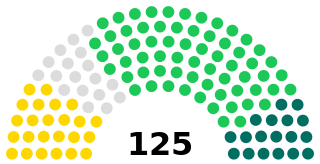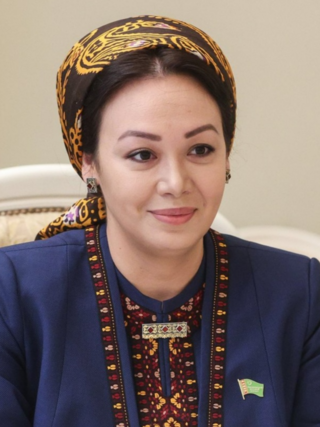 |
|---|
People's Council elections were held in Turkmenistan on 28 March 2021 to elect 48 of the 56 members of the People's Council or Halk Maslahaty. Another eight were appointed by the president on 14 April 2021.
 |
|---|
People's Council elections were held in Turkmenistan on 28 March 2021 to elect 48 of the 56 members of the People's Council or Halk Maslahaty. Another eight were appointed by the president on 14 April 2021.
No election held since the country's independence from the Soviet Union has been judged to be free or fair, and international media often refer to Turkmenistan as an autocracy with a rubber-stamp parliament. [1] [2]
Following constitutional amendments in September 2020, the unicameral 125-seat Assembly was replaced by the bicameral National Council (Milli Geňeş) with the Assembly (Mejlis) becoming the lower house and the 56-seat People's Council (Halk Maslahaty) becoming the upper house. [3] [4] Foreign policy analysts linked the changes with President Berdimuhamedow smoothening avenues for an upcoming transfer of power to his son. [2]
Councils of the five provinces (welaýat) and the capital city (şäher) nominated eight members each, while the remaining eight members were to be appointed by the president. [4] To be nominated as a member, one had to be a citizen of Turkmenistan above 30 years of age with a minimum educational qualification of graduation and have permanent residence status for the previous ten years, with no active criminal proceedings. [4] [lower-alpha 1]
The 15-member Central Election Commission—established in 2019 by a presidential decree as an "independent organ of the state"—was tasked with overseeing the entire process, with aid from provincial election commissions. [5]
Nominations ran from 6 February to 2 March. [5] [lower-alpha 2] 112 candidates—21 from Ahal province, 21 from Balkan province, 18 from Dashoguz province, 18 from Lebap province, 17 from Mary Province, and 17 from Ashgabat—entered the race. [5] 83 were men and 29 women. [5]
Biographic sketches of all candidates were broadcast in Turkmen mass media by the first week of March. [5] [7] [lower-alpha 3] Most were civil servants. [10] Campaigning was permitted until 26 March. [5]
Each province (and the capital) was assigned a single voting center. [5] Polling was open from 09:00 [lower-alpha 4] to 23:00 on 28 March; the entrance area was livestreamed on the website of the Election Commission for the entire duration. [5] [12]
Candidates were styled as "Family name, First name, Patronymic" [lower-alpha 5] , and sorted alphabetically in the ballot; age, occupation, place of residence, and place of work were also mentioned. [5] Out of the 231 councillors, who registered as voters, 228 took part. [5] [lower-alpha 6]
The Election Commission claimed to have appointed 440 observers—420 from the six approved political parties, 20 from civil society organizations, and 20 candidate-proxies—for "increasing transparency" of the election. [5] [2] Foreign observers were not allowed. [5]
Ballots were counted, and results declared the next morning. [5] The following candidates were elected: [5] [lower-alpha 7]
| Ahal Province | Balkan Province | Dasoguz Province | Lebap Province | Mary Province | Ashgabat City |
|---|---|---|---|---|---|
| Enejan Ataýewa [lower-alpha 8] | Annatagan Amanow | Ýazdurdy Altybaýew | Ahmed Bekiýew | Orazdurdy Abdyýew | Mähri Bäşimowa [lower-alpha 8] |
| Gurbanguly Berdimuhamedow | Araz Arazow | Ýazmämmet Ataýew | Begenç Çaryýew | Maksat Atajanow | Nazar Çöliýew |
| Döwletgeldi Çaryýew | Maral Ataklyçewa [lower-alpha 8] | Babajyk Babajykow | Babamurat Halow | Gurbanmyrat Ataýew | Muhammetnazar Geldiýew |
| Ogulmaral Hojaýewa [lower-alpha 8] | Döwletgeldi Gazakow | Amangylyç Golbaýew | Bähbit Pigamow | Batyr Gylyçdurdyýew | Jeýhun Igdirow |
| Seýdi Jumaýew | Wepaberdi Goýunlyýew | Ýeňiş Haýytjanow | Gülnaz Rejepowa [lower-alpha 8] | Halymberdi Hajyýew | Bazar Muhammetgulyýew |
| Hydyrmuhammet Orazmämmedow | Süleýman Gylyçjanow | Abdulla Kakaýew | Umida Saparowa [lower-alpha 8] | Ogulgerek Hydyrowa [lower-alpha 8] | Baýramgözel Myradowa [lower-alpha 8] |
| Aýgözel Öwezowa [lower-alpha 8] | Äşe Hanalyýewa [lower-alpha 8] | Atageldi Musaýew | Bahar Seýidowa [lower-alpha 8] | Merdan Kömekow | Döwletmyrat Myratgulyýew |
| Eşret Täşliýew | Täzegül Nyýazowa [lower-alpha 8] | Akmyrat Taganow | Magtym Ýangibaýew | Parahat Şamyradow | Aýgözel Nurlyýewa [lower-alpha 8] |
Twenty-seven percent of the winning candidates were women. [12] Berdimuhamedow was alleged to have received 100% of the vote. [1] [5]
On 14 April 2021, the People's Council held its first session. [13] Berdimuhamedow inaugurated the complex, addressed the winners, and went on to appoint eight more members. [13] [lower-alpha 9] Thereafter, the Council Chair and Deputy Chair were elected. [13] Also elected were the Chairs and Deputy Chairs of five House Committees.

The politics of Turkmenistan nominally takes place in the framework of a presidential republic, whereby the President of Turkmenistan is nominally both head of state and head of government. However, as of 21 January 2023 a "national leader" was appointed who chairs an independent People's Council (viz.) with authority to amend the constitution, and who exercises supreme political authority. No true opposition parties are allowed; every registered political party supports the third and current President Serdar Berdimuhamedow. The country is frequently described as a totalitarian state.

Ashgabat is the capital and the largest city of Turkmenistan. It lies between the Karakum Desert and the Kopetdag mountain range in Central Asia, approximately 50 km away from the Iran-Turkmenistan border. The city has a population of 1,030,063.

Ahal Region is one of five provinces of Turkmenistan. It is in the south-center of the country, bordering Iran and Afghanistan along the Kopet Dag Range. Its area is 97,160 km2 (37,510 sq mi) and population 886,845.

Turkmenistan elects on national level a head of state — the president — and a legislature. The elections in Turkmenistan since its split from the Soviet Union have been widely criticized for being neither free nor fair and attempting to give an appearance of legitimacy to what is in reality a dictatorship. Parties in Turkmenistan are the Democratic Party of Turkmenistan and the Party of Industrialists and Entrepreneurs. The president has a seven-year term, while the legislature has a five-year term.

Turkmenistan is divided into five regions, or welaýatlar and one capital city (şäher) with provincial legal status. They are Ahal, Balkan, Dashoguz, Lebap and Mary, plus the capital city of Ashgabat. Each province is divided into districts. As of 20 December 2022 there were 37 districts, 49 cities, including 7 cities with district status, 68 towns, 469 rural councils and 1690 villages in Turkmenistan.

The president of Turkmenistan, officially the president and chairman of the Cabinet of Ministers of Turkmenistan, is the head of state and head of government of Turkmenistan. The president is also the supreme commander in chief of the Armed Forces of Turkmenistan and heads the State Security Council.

The People's Council of Turkmenistan is Turkmenistan's independent "representative body" exerting supreme constitutional authority. It includes in its membership, but is not considered part of, the legislature. Among other things, it is empowered to amend the constitution. Its chairperson is appointed by the president and is designated the "National Leader". State media referred to the People's Council as the "supreme organ of government authority". From 2018 to 2023 it was the upper chamber of Turkmenistan's Parliament, the "National Council".

The Assembly is the unicameral legislature of Turkmenistan. Between March 2021 and 21 January 2023, it was the lower house of the National Council of Turkmenistan. It consists of 125 members, who are elected for five-year terms in single-seat constituencies.
Agriculture in Turkmenistan is a significant sector of the economy, in 2019 contributing 11.7% of the GDP and employing 40% of the workforce. However, only 4% of total land area is cultivated.

Gurbanguly Mälikgulyýewiç Berdimuhamedow is a Turkmen politician and former dentist who is currently the Chairman of the People's Council of Turkmenistan. He previously served as the 2nd President of Turkmenistan from 2006 to 2022, when he entered into a power-sharing arrangement with his son, Serdar, the current president.

The State Security Council of Turkmenistan is an important decision-making body in the field of the defence of Turkmenistan. It is the highest decision-making body in the armed forces next to the Ministry of Defense and the General Staff, with its members directly advising the President of Turkmenistan on matters of national security.
The Academy of Sciences of Turkmenistan is a state body in Turkmenistan founded in 1951, which is responsible for the implementation of Turkmen scientific and technical policy. The academy was closed under president Saparmurat Niyazov and reopened by his successor, Gurbanguly Berdimuhamedow.
Kasymguly Gulmyradovych Babayev is a Turkmen political figure and economist.

The Cabinet of Ministers of Turkmenistan is the chief executive body in Turkmenistan. The Cabinet of Ministers of Turkmenistan is appointed by the President of Turkmenistan who is both the chief of state and head of government. In addition to holding specific portfolios in most cases, six deputy chairpersons of the Cabinet of Ministers may also be assigned responsibility for oversight of a province of Turkmenistan or of the capital city.

Presidential elections were held in Turkmenistan on 12 February 2017. This was Turkmenistan's fifth presidential election and decided who would be the country's president for the next seven years. Incumbent President Gurbanguly Berdimuhamedow won with more than 97% of the vote, similar to the results of the 2012 elections.

Serdar Gurbangulyýewiç Berdimuhamedow is a Turkmen politician serving as the third and current president of Turkmenistan since 19 March 2022. Berdimuhamedow had previously served in several other positions within the government of his father, Gurbanguly, the long-standing authoritarian ruler of Turkmenistan. The father and son entered into a power-sharing arrangement in 2022 whereby they jointly rule an authoritarian system of government in Turkmenistan.
Shamuhammet Durdylyyev is a Turkmen politician. He was the first mayor of the city of Arkadag. He previously served as deputy chairman of the Turkmenistan government for construction and industry and as mayor of Ashgabat, Turkmenistan's capital city. He is currently on the board of directors of the consortium of construction companies responsible for building the "Ashgabat City" residential development.

The National Council of Turkmenistan was Turkmenistan's bicameral national legislative body or parliament from March 2021 until January 2023. The upper chamber was the People's Council and the lower chamber was the Assembly. The National Council was created in March 2021 following election of members to the upper chamber, which in turn followed a constitutional amendment in late 2020.

Arkadag is a city in southern Turkmenistan. It became the regional capital of Ahal Province effective 20 December 2022. It is a largely greenfield development started in 2019 with an initial budget of $1.5 billion. The city was named in honor of former President Gurbanguly Berdimuhamedov, who is officially entitled Arkadag. Uniquely among Turkmen cities, Arkadag is by law designated a "city of state importance".

Dünýägözel Akmuhammedowna Gulmanowa is a Turkmen politician currently serving as speaker of Turkmenistan's parliament.